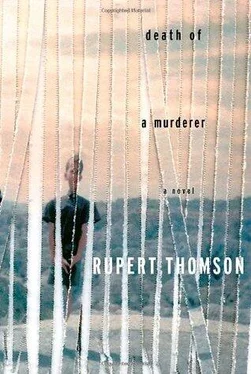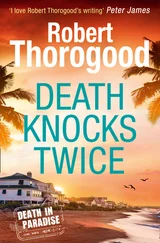“Normally I do. Today my son’s in a concert, though. At school.” She looked past him, into the back of the car. “Is she dead?”
He glanced over his shoulder. On top of the pile of papers from the weekend was Saturday’s Telegraph, the famous picture of the murderer occupying half the front page.
“She died on Friday,” he said.
“I had no idea.” She shook her head. “So terrible, what she did.”
He nodded absently.
“People like that,” she said, “I think they do deals.”
He stared at her with her frizzy hair and her face all spread out like a house with its windows flung wide open. “What do you mean?”
“They go further than anyone else, and they have to pay a price for that.” Her eyes moved to the picture behind him. “That’s why she’s got that look.” Turning to Billy again, she smiled almost sadly. “You don’t know what I’m talking about, do you?”
“Maybe I’m still half asleep.”
She gave him a steady, slightly patronising look that told him tiredness had nothing to do with it.
When she had driven away, he reached over into the back seat and got hold of the paper. Propping it up against the steering-wheel, he scanned the article on the front page. There was nothing in it that he didn’t already know. The facts of her death, a description of the tape. A brief account of how the murderers behaved in court. Sullen, defiant. Passive. In his memory, it was this apparent passivity that had upset people most of all, since it had been seen as a form of arrogance, a clear indication that the couple in the dock were not only unrepentant but contemptuous, both of those who sat in judgement over them and — far more shocking, this, if true — of those who had suffered at their hands. Do what you like, their silence seemed to say. It makes no difference to us.
His eyes lifted to the woman’s face. That gaze, always described as empty. The black mouth curling a fraction, as if suspecting the photographer of weakness or inferiority. And now, suddenly, he had an inkling of what the swan lady might have been getting at. The woman and her lover had gone where no one else could follow. They probably thought of themselves as mavericks, dare-devils — pioneers. They were special, in other words. Unique. But then to be arrested, charged, held under lock and key…It would all have seemed so humdrum. Pathetic, really. No wonder they had joked about it when they wrote to each other from their separate cells. What did it mean to be put on trial? What did that have to do with anything?
He ought to be heading home, he knew that, but there was something he had to do first. Folding the Telegraph, he stepped out of the car. A still grey morning, sky the colour of an unlit light-bulb. The mud-flats glistening. Down by the river’s edge gulls glided through the air, their wing-tips seeming to clear the land by no more than a few inches. He opened the back door and gathered up the rest of the newspapers, then he locked the car and set off along the grass verge. This wouldn’t take long, he thought. Apart from anything else, it would warm him up. Get his circulation going.
The road snaked right, then left, then right again before it slid beneath the bridge. On one of the bends was a red house that stood alone, with fir trees in the garden, and just beyond it, if he remembered correctly, was a bus stop. He walked fast, facing the oncoming traffic, the papers wedged under one arm. He kept his eyes on the ground. Though the grass verge was raised, it hugged the road, and sometimes the slipstream from a passing vehicle would push him sideways. He saw a powder-blue Cortina parked in front of a white wall. He saw a boy’s head sinking below the smooth, dark water of a reservoir. He saw a woman in a black wig, smoking. All these images were linked.
Once, he glanced over his shoulder. His car had shrunk to the size of a toy.
Before he even reached the house, he came across a tall grey wheelie bin. Positioned at one end of a lay-by, it had been fastened to a metal post with a padlock and chain. The words printed on the lid — NO GARDEN WASTE — were partially obscured by bird droppings. This wasn’t the bin he remembered, nor was it where he had expected it to be. Given its location, he could have driven. Oh well. Lifting the lid, he peered inside. Big Mac cartons, a Kit-Kat wrapper, the remnants of a Happy Meal. A crushed Coke can. The nation’s diet in a nutshell.
When he heaved his stack of newspapers into the bin, Saturday’s Telegraph stayed on top. The woman’s face stared up at him, stubborn, provocative, daring him to act. Flipping the paper over, he pushed it as deep as it would go, then closed the lid firmly and stood back.
He looked around.
The day was grey and glassy, as before. Traffic roared over the great arc of the bridge. In front of him, perhaps a hundred yards away, a yacht swung slowly anti-clockwise on the water. The man who dug for ragworms and razorfish had told him what that meant.
The tide was on the turn.
A Mercedes flashed past, one glimpse of the young blonde woman behind the wheel enough to convey her style, her wealth, her sense of purpose. Billy glanced at his watch. It was nine thirty. Five minutes back to the car, then a fifteen-minute drive. He could be home before ten.
As he hurried away from the lay-by, his left foot caught in a dip in the grass verge, and he fell sideways, then tumbled down the bank, landing awkwardly at the edge of the river. He hadn’t hurt himself, but his trousers were covered with mud, and water had seeped into one of his shoes. He was still sitting there, unable to believe what had happened, when his mobile rang. Even without looking, he knew it was Sue. She would have taken Emma to school, and then returned to an empty house. She’d be wondering where he’d got to.
He took the phone out of his pocket with his left hand, which wasn’t quite so muddy. “Is that you, Sue?”
“Billy,” she said, “where are you?”
Climbing to his feet, he shook his head. “I’m on my way back.” And then, before she could speak again, “Listen, did you get my message?”
“No.”
“I sent you a text — last night…”
“I haven’t checked my mobile yet. What did it say?”
“I was hoping we could have breakfast together,” he said.
“You’re not too tired?”
He smiled. “No.”
“How long are you going to be?”
“Twenty minutes. Maybe less.”
Once Sue had hung up, he wiped the mud off his phone and pushed it back into his pocket, then he looked down at his trousers. What a mess. He would have to take his uniform to the dry-cleaner’s later on. Still, at least he didn’t have to go to work till Sunday. Four days off — and he needed it as well. Maybe at the weekend he could drive Sue and Emma to the village that perched right on the tip of the peninsula. There was a pub out there — the something Arms. They could have lunch. He could already imagine it: the smell of the wooden furniture, waxy, slightly sweaty, almost human, the pints of beer and plates of battered cod, the cloudy, grey-green water just beyond the door. Afterwards, they would walk along the beach, perhaps, and if he looked hard enough, if he was lucky, he might see a redshank or a godwit, and it would surprise them that he knew the name of a bird. Well, it would surprise Sue, anyway. Emma’s reactions were less easy to predict. He wondered what she would say if she could see him now. Mucky. The word would be delivered at top volume. Her head would be tilted at an aggressive angle, and her hands would probably be on her hips. Mucky pup. He found that he was laughing.
On Sunday evening, he had left Emma in the bath while he went downstairs to check that their supper wasn’t burning. When he was in the kitchen, though, he panicked, imagining that she might be drowning, and he ran back up the stairs and burst into the bathroom.
Читать дальше












